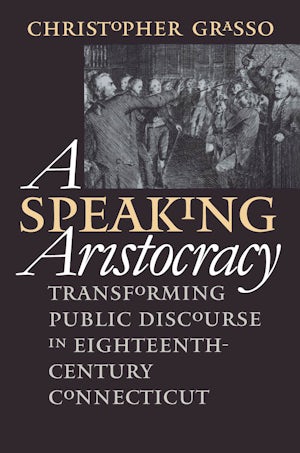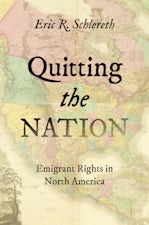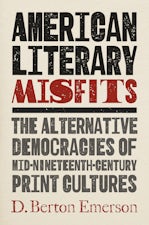A Speaking Aristocracy
Transforming Public Discourse in Eighteenth-Century Connecticut
By Christopher Grasso
524 pp., 6.125 x 9.25, 18 illus., 4 figs., appends., notes, index
-
Paperback ISBN: 978-0-8078-4772-5
Published: March 1999 -
E-book EPUB ISBN: 978-0-8078-3920-1
Published: December 2012 -
E-book PDF ISBN: 979-8-8908-7090-2
Published: December 2012
Published by the Omohundro Institute of Early American History and Culture and the University of North Carolina Press
Buy this Book
- Paperback $55.00
- E-Book $29.99
Published by the Omohundro Institute of Early American History and Culture and the University of North Carolina Press
Awards & distinctions
2000 Homer Babbidge Prize, Association for the Study of Connecticut History
In New England through the first half of the century, only learned clergymen regularly addressed the public. After midcentury, however, newspapers, essays, and eventually lay orations introduced new rhetorical strategies to persuade or instruct an audience. With the rise of a print culture in the early Republic, the intellectual elite had to compete with other voices and address multiple audiences. By the end of the century, concludes Grasso, public discourse came to be understood not as the words of an authoritative few to the people but rather as a civic conversation of the people.
About the Author
Christopher Grasso is associate professor of history at the College of William and Mary and editor of the William and Mary Quarterly.
For more information about Christopher Grasso, visit
the
Author
Page.
Reviews
"[An] outstanding new book. . . . A wide variety of scholars will be fascinated by this book. Even though there have been many fine studies of eighteenth-century intellectual history, few are as sophisticated, as subtle, and as learned as A Speaking Aristocracy."--Journal of American History
"Grasso traces not simply the transformation of the modes of discourse, and of the membership of the speaking elite, but also throughout this fine study analyzes the words and ideas of their eighteenth-century world."--Connecticut History
"A significant contribution to our understanding of high culture in one place and time. . . . Engaging."--Journal of the Early Republic
"Although Dickinson is mentioned briefly in only four separate instances, Grasso's well researched and organized study advocating anger as a 'mode of inquiry' may stimulate scholars to revisit Dickinson's poems and letters."--Emily Dickinson International Society Bulletin
"Grasso has written an important book. Historians of public life throughout the early modern Atlantic world will want to explore his account of how the learned men of eighteenth-century Connecticut--the speaking aristocracy--reshaped their discursive practices in an age of revolution."--American Historical Review
"Grasso’s book, among its many strengths . . . convinces us that how people think about themselves is supremely worthy of the historian’s study. It becomes essential reading for all serious students of American civilization."--William & Mary Quarterly




